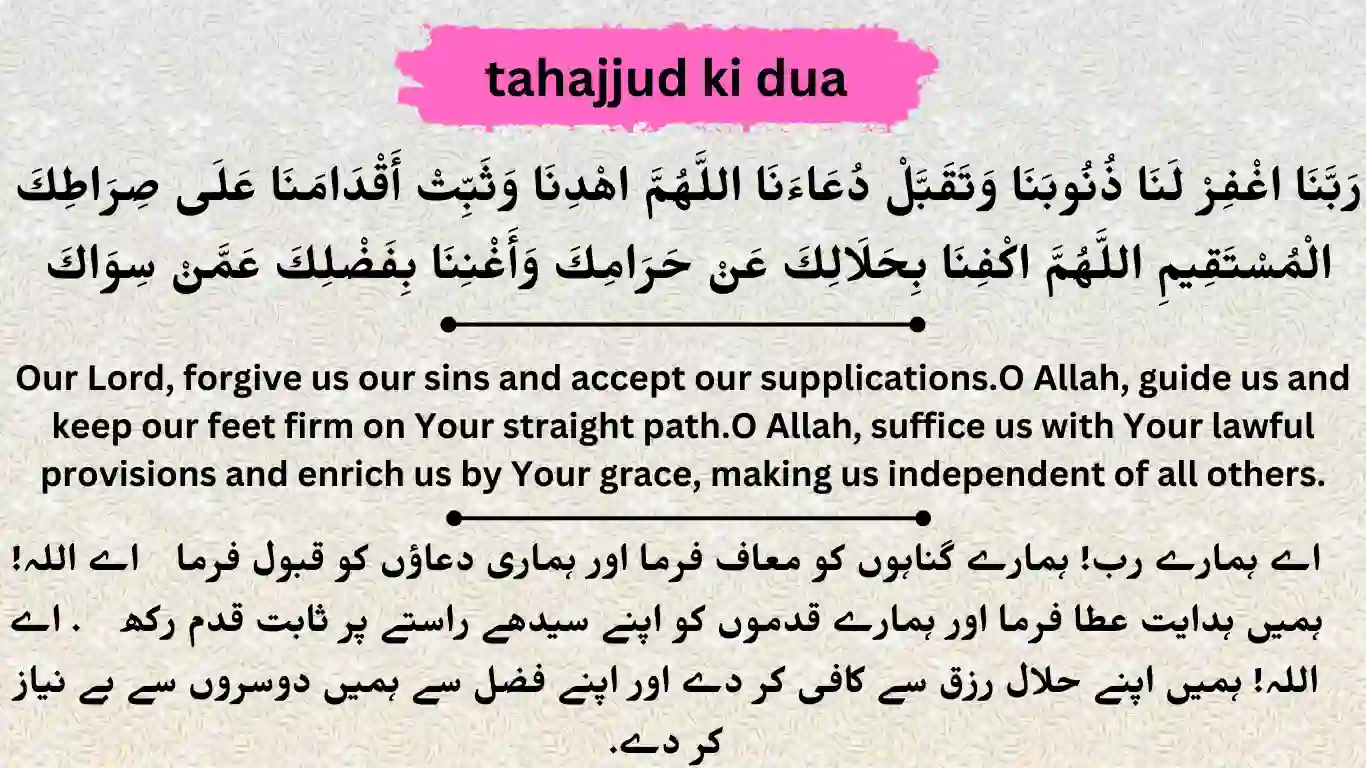Tahajjud is a voluntary prayer performed in the stillness of the night, a time when the world is asleep and the heart is closest to Allah (SWT). The act of waking up in the last third of the night to engage in worship demonstrates deep faith and devotion. One of the key aspects of this prayer is the heartfelt Tahajjud Ki Dua.
What is Tahajjud?
Tahajjud is a special form of prayer offered after Isha Salah and before Fajr Salah. It is mentioned in the Quran and Hadith as a means of gaining closeness to Allah, seeking forgiveness, and having one’s supplications answered.
The Importance of Tahajjud Ki Dua
The last third of the night is one of the most sacred times for making dua. Allah descends to the lowest heaven during this time and listens to the prayers of His servants. The Prophet Muhammad (PBUH) said:
“Our Lord descends to the lowest heaven during the last third of the night, inquiring: Who will call upon Me so that I may answer him? Who will ask Me so that I may give him? Who will seek My forgiveness so that I may forgive him?”
(Sahih Bukhari, Sahih Muslim)
Tahajjud Ki Dua: A Comprehensive Supplication
1. General Dua for Forgiveness and Mercy
Arabic
رَبَّنَا اغْفِرْ لَنَا ذُنُوبَنَا وَتَقَبَّلْ دُعَاءَنَا
English Translation
“Our Lord, forgive us our sins and accept our supplications.”
Urdu Translation
اے ہمارے رب! ہمارے گناہوں کو معاف فرما اور ہماری دعاؤں کو قبول فرما۔
2. Dua for Guidance and Strength
Arabic
اللَّهُمَّ اهْدِنَا وَثَبِّتْ أَقْدَامَنَا عَلَى صِرَاطِكَ الْمُسْتَقِيمِ
English Translation
“O Allah, guide us and keep our feet firm on Your straight path.”
Urdu Translation
اے اللہ! ہمیں ہدایت عطا فرما اور ہمارے قدموں کو اپنے سیدھے راستے پر ثابت قدم رکھ۔
3. Dua for Seeking Allah’s Help and Provision
Arabic
اللَّهُمَّ اكْفِنَا بِحَلَالِكَ عَنْ حَرَامِكَ وَأَغْنِنَا بِفَضْلِكَ عَمَّنْ سِوَاكَ
English Translation
“O Allah, suffice us with Your lawful provisions and enrich us by Your grace, making us independent of all others.”
Urdu Translation
اے اللہ! ہمیں اپنے حلال رزق سے کافی کر دے اور اپنے فضل سے ہمیں دوسروں سے بے نیاز کر دے۔
Benefits of Tahajjud Ki Dua
- Answered Prayers: Allah promises to answer the duas made in the last third of the night.
- Forgiveness of Sins: Tahajjud is a time for seeking forgiveness and cleansing the soul.
- Inner Peace: Engaging in night prayer brings tranquility and strengthens the connection with Allah.
- Increased Faith: The discipline of waking up at night builds piety and dedication.
Practical Tips for Performing Tahajjud
- Sleep Early: Ensure adequate rest to wake up for Tahajjud.
- Set an Alarm: Choose a time that allows you to pray before Fajr.
- Keep It Simple: Even two rakats followed by heartfelt duas are highly rewarding.
- Consistency Matters: Regularity in performing Tahajjud builds a strong spiritual habit.
FAQs
The best time to pray Tahajjud is during the last third of the night, which begins after two-thirds of the night have passed until Fajr.
Yes, you can make personal duas during Tahajjud. This is a powerful time to ask Allah for guidance, forgiveness, and blessings.
There is no fixed number of rakats for Tahajjud. You can pray as few as two rakats or as many as you can manage. The key is sincerity and devotion.
Conclusion
Tahajjud Ki Dua is a deeply spiritual act that opens the doors of mercy, forgiveness, and blessings. The night prayer is not just an opportunity to pray but a means to strengthen your bond with Allah. Make the effort to include this beautiful practice in your life, and let your heartfelt supplications bring you closer to your Creator.
May Allah accept your Tahajjud and grant you peace, success, and happiness in this world and the Hereafter.




